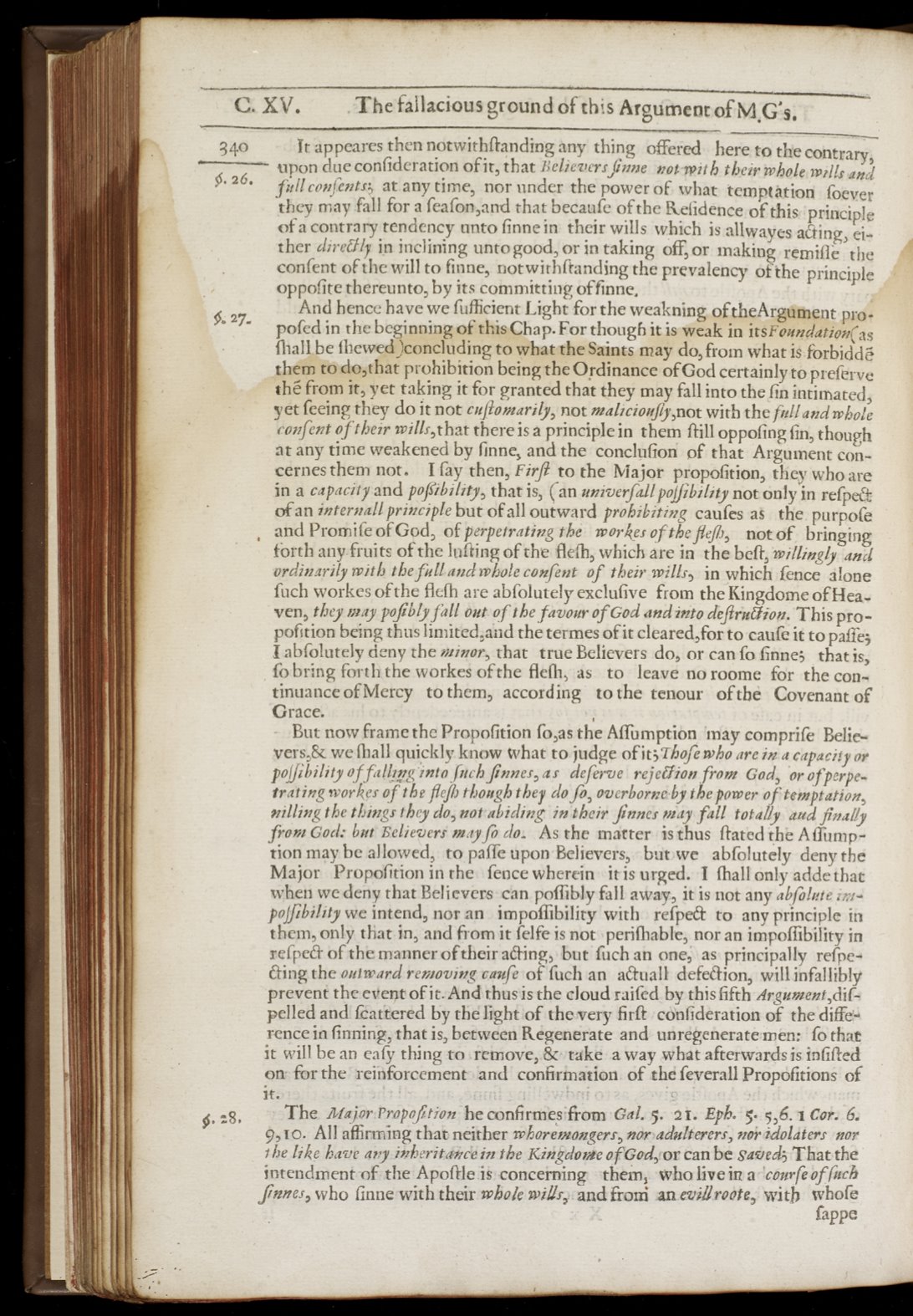

C. XV.
The
fallacious
ground of
this Argument
of KG's.
340
It
appeares
then notwithffanding
any
thing
offered
here
to
the
contrary,
g
zG
upon
due
contiderationof
it,
that
Believers
fnne
not-withtheirwholewills
-and
fill
confents
at
any time,
nor under the
power
of
what
temptation
foever
they
may fall
for
a
feafon,and
that
becaufe
of
the
ß.
efidence
of
this
principle
of
a
contrary tendency unto
finne
in
their
wills which
is
allwayes aéting, ei-
ther
direîlly
in
inclining
unto good,
or
in
taking
off,
or
making remiflè the
confent
of
the
will
to
finne,
notwithfianding the
prevalency
of
principle
oppofite
thereunto, by
its
committing
offinne.
4, 27.
And hence have we
fuf
icient
Light
for
the
weakning
oftheArgumentpro-
pofed
in
the beginning
of
this Chap. For though it
is
weak in its
F
oundation(as
Mall
be fhewed)concluding
to what the
Saints
may do, from
what
is
forbid*"
them to
do,that
prohibition
being the
Ordinance ofGod
certainly
to
preferve
thé
from
it, yet taking
it
for granted that they
may
fall
into the
fin
intimated,
yet
feeing
they do it
not
cuftomarily,
not
malicioofly,not
with
the
All
and
whole
confent
of
their
wills,that there
is
a
principle
in
them
fä11
oppofing
fin,
though
at
any
time weakened
by
finne,
and
the
conclufiori
of that
Argument con-
cernes them
not.
I fay
then,
Firfl
to
the Major
propofition, they who are
in a capacity
and
poftibility,
that
is,
(an
univerfall
pojfibility
not
only
in
refpeCt
of
an
internall
principle
but
of
all
outward
prohibiting caufes
as
the purpofe
and Promife
of
God,
of
perpetrating the
workes
of
the
AP,
not
of
bringing
forth
any fruits
of
the
lofting
of
the
flefh, which
are
in
the
bell.,
willingly
and
ordinarily with
the
folland
whole
confent
of
their wills, in which
fence
alone
fuch
workes
ofthe
flelh
are abfolutely
exclufive from
the
Kingdome
of
Hea-
ven,
they
may pofibly
fall
out
of
the
favour
of
God
and
into
deflruWíion.
This
pro-
pofition being thus
limited,and the termes
of
it cleared,for
to
caufe
it
to
paffe;
I
abfolutely deny
the
minor,
that true
Believers
do, or
can fo finne;
that
is,
fo
bring forth the
workes
of
the
flefh, as
to
leave no roome for
the
con
-
tinuance ofMercy to them, according
to
the tenour
ofthé
Covenant
of
Grace.
But now
frame
the
Propofition
fo,as
the
Affumption May comprife Belie-
vers,& we
fhall
quickly know
what
to
judge
of
it;Thofe
who
are
in
a capacity or
pol
ibility
offallirgSnto
fuch
fnnes,
as
deferve rejection
from
God, orofperpe-
tracing
workes
of
the
fleJh
though they
do
fo,
overborneby
the
power
of
temptation,
pilling
the things
they
do,
notabiding
in
their
finnes
May
fall
totally
and
finally
from
God:
but
Believers may
fo
do. As
the matter
is
thus
(Fated
the
A
fl'ump-
tion
may
be
allowed,
to
paffe
upon
Believers,
but
we
abfolutely
deny
the
Major Propofition
in
the
fence wherein
it
is
urged.
I
{hall
only
adde
that
when
we
deny
that
Believers can
poffibl.y
fall away,
it
is
not
any
abfolute
ins
-
poffibility we
intend, nor an
impofíibility with
refpe&
to
any principle in
them,
only
that
in, and from
it
felfe
is
not
perifhable,
nor
an
impoffibility in
refpe&
of
the
manner
of
their
a&ing,
but
filch
an one;
as
principally refpe-
ding
the
outward
removing
caufe
of
fuch an
a
&uall
defeaion,
will infallibly
prevent the
event
of
it.
And thus
is
the cloud railed
by
this fifth Argument,dif-
gelled and fcattered
by
the light
of
thevery
firff confideration
of
the
differ
rence
in
finning,
that
is,
between
Regenerate and unregeneratemen:
fo
that
it
will
bean
eafy
thing
to
remove,
&
take
a way
what afterwards
is
infifled
on:
for
the
reinforcement and confirmation
of
the
feverall Propofitions
of
it.
4.
,s,
The
Major
Propo
/ition he confirmes from
Gal.
5.
2I.
Eph.
5.
5,6.
i
Cor. 6.
9,
ro.
All affirming
that
neither
whoremongers,
nar
adulterers,
nor idolaters nor
the
like have
any
inheritance in the
Kingdome
o
fGod,
or
can
be saved;
That
the
intendment
of
the
Apoflle.is
concerning
them,
who
live
in
a
'courreof
fuch
finnes, who
finne
with their
whole
wills,
.
and
froni
an
evil)route,
with
whole
fappe










